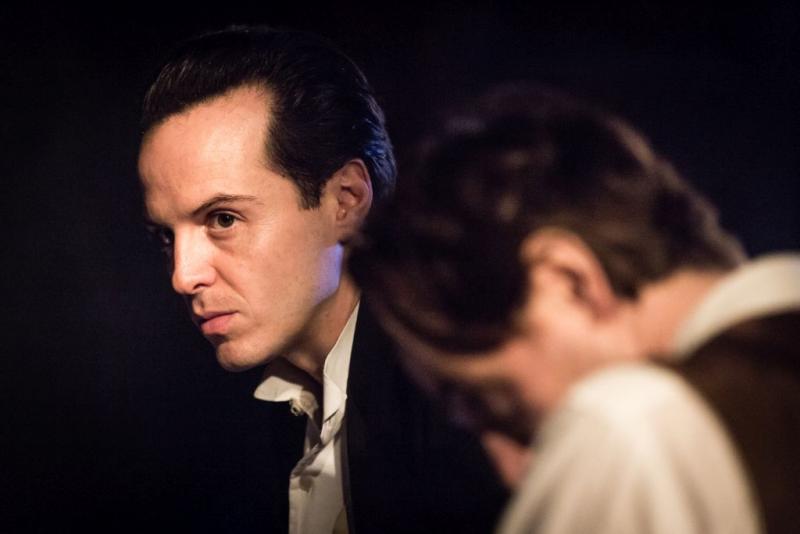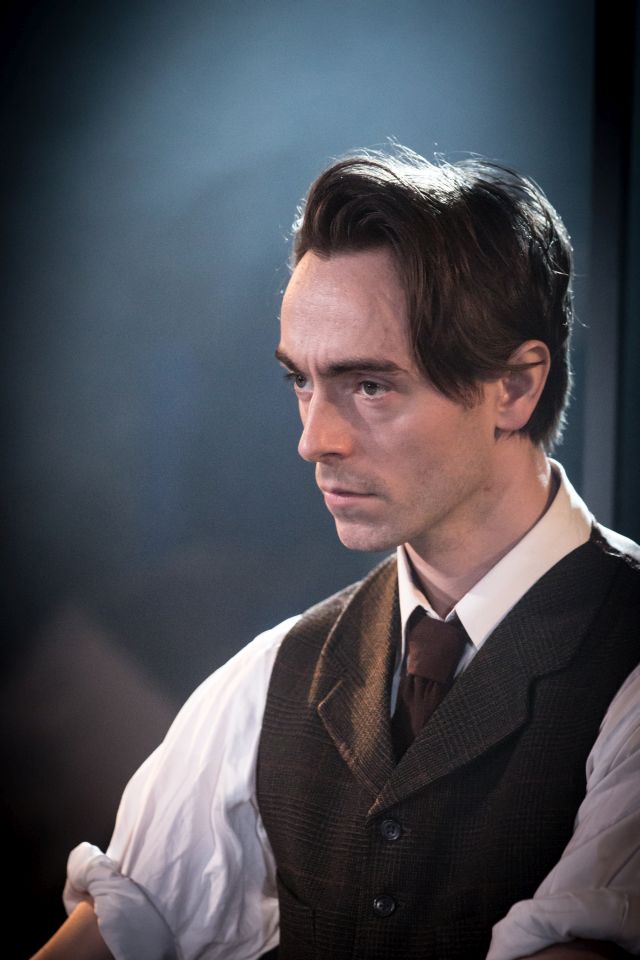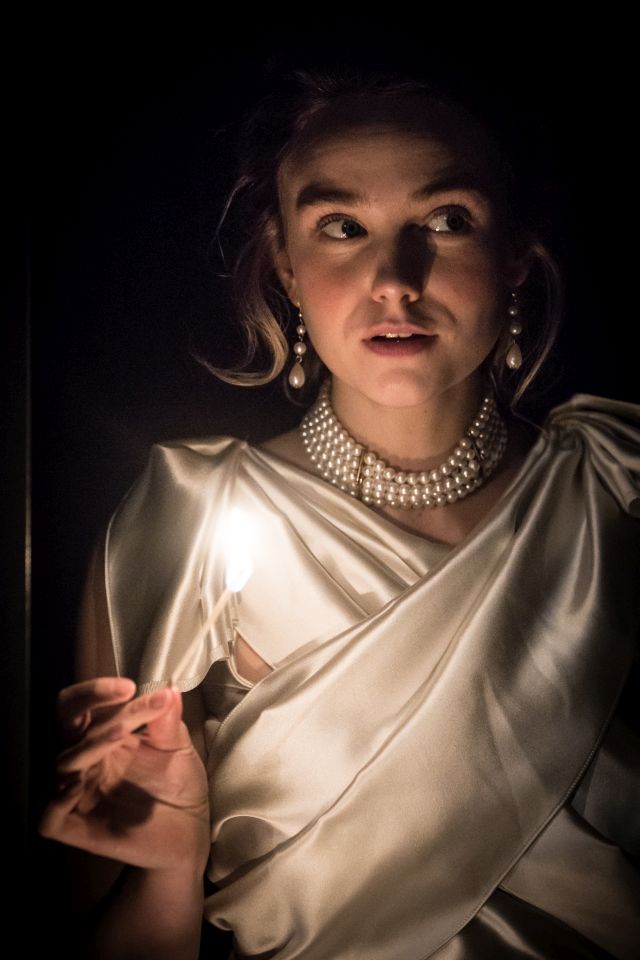The Dazzle, FOUND111 | reviews, news & interviews
The Dazzle, FOUND111
The Dazzle, FOUND111
Off-Broadway play doubly disturbing in London debut

The proverbial pond that separates the New York and London theatres has had a seismic effect on The Dazzle, Richard Greenberg's ironically titled play from 2002 that in every way seems darker, stranger, and more compelling in its British premiere than it did when I first caught it Off Broadway.
 Simon Evans's production benefits enormously from two of the most distinctive actors this side of the Atlantic in Andrew Scott and David Dawson, both of whom have a stylised, heightened mode of performance that turns out to be ideally suited to Greenberg's verbally rococo landscape. As ever with this prolific writer, who was premiering The Dazzle in New York within months of the world premiere in London of the entirely different baseball-themed Take Me Out at the Donmar, words come naturally to characters who fold "persiflage" and "miasmic" into their discourse with ease.
Simon Evans's production benefits enormously from two of the most distinctive actors this side of the Atlantic in Andrew Scott and David Dawson, both of whom have a stylised, heightened mode of performance that turns out to be ideally suited to Greenberg's verbally rococo landscape. As ever with this prolific writer, who was premiering The Dazzle in New York within months of the world premiere in London of the entirely different baseball-themed Take Me Out at the Donmar, words come naturally to characters who fold "persiflage" and "miasmic" into their discourse with ease.
Scott's Langley Collyer speaks, for instance, of "the next hour [being] smashed to smithereens" as if he had stepped out of a novel by F Scott Fitzgerald, and both that character and his brother, Homer, have names worthy of an author whose presence has long lingered over Greenberg's diverse output. But on the more fundamental level of human connection, Langley in particular runs aground in a production that makes clear virtually from the outset that the abiding theme of the play is damage, whereas in New York it seemed mostly to be about Allen Moyer's admittedly impressive set. (Dawson as Homer, pictured above)
Greenberg's source is the actual and startling tale of two Manhattan siblings, hoarders both, who died entombed amid the clutter of their Harlem brownstone in 1947; thematically, the play is of a piece with the forthcoming Southwark Playhouse British premiere of the Broadway musical Grey Gardens, itself a chronicle of the real-life fall from grace into squalour of a certain sector of the American upper-class.
But whereas critics in 2002 derided Greenberg for an author's note – reprinted in the London programme – in which he admitted to "know(ing) almost nothing" about the Collyers while nonetheless feeding their lives into his play, Evans and his ace cast make immediately clear that the play remains a fantasia, not a biography – a meditation on a surrender to a shared madness that both Scott and Dawson play for keeps.
Scott has always possessed a distinctive, somewhat dreamy vocal quality, which on this occasion allows Langley to talk, as he puts it, "in a kind of stream" while also drifting off into the unknown. His face at times is overtaken by a half-smile that makes you feel as if this apparently mild-mannered elocutionist might be capable of grievous harm, not least when the musically-minded "Lang" talks of "eradicating" the American composer John Philip Sousa. This is a man who speaks of having too many senses, and Scott communicates a gathering discomfiture that is deeply eerie to behold.
 Dawson gives a shouty, larger-scale star turn – in musical terms, he's the timpanist of the piece – and there are moments when he seems to be pitching his performance to a far larger venue than the rather cramped, none-too-comfortable FOUND111. (Woe betide those who aren't seated at the end of a row.) But playing the reluctant, more pragmatic minder of a brother who exists in some cleanliness-averse netherworld all his own – Langley, we're told, wouldn't wash if it weren't for Homer – Dawson movingly suggests the carer who might like some care for himself.
Dawson gives a shouty, larger-scale star turn – in musical terms, he's the timpanist of the piece – and there are moments when he seems to be pitching his performance to a far larger venue than the rather cramped, none-too-comfortable FOUND111. (Woe betide those who aren't seated at the end of a row.) But playing the reluctant, more pragmatic minder of a brother who exists in some cleanliness-averse netherworld all his own – Langley, we're told, wouldn't wash if it weren't for Homer – Dawson movingly suggests the carer who might like some care for himself.
A third character complicates the filial dynamic in the form of Milly (Joanna Vanderham, pictured above), an heiress who has returned from treatment of some unspecified sort in Vienna – paging Dr Freud! – and who shuttles between the affections of the brothers before herself meeting an untimely end. (Followers of Scott's career can connect this triangular relationship up to Design for Living, in which he starred at the Old Vic in 2010.) Tasked with the difficult assignment of playing a character described elsewhere as "boring", Vanderham is anything but, her physical beauty as evident as the emotional clarity that the actress lends to the post-interval revelation of Milly's past.
It's not her fault if one's prevailing memory of a production that seems to exist in a rolling semi-darkness as if to suggest the characters' half-lives is of one quiet if significant exchange between the brothers. "I love our life," says Langley in a momentary eruption of enthusiasm, to which Homer replies with the barely audible, immensely telling single word, "oh".
rating
Buy
Explore topics
Share this article
The future of Arts Journalism
You can stop theartsdesk.com closing!
We urgently need financing to survive. Our fundraising drive has thus far raised £49,000 but we need to reach £100,000 or we will be forced to close. Please contribute here: https://gofund.me/c3f6033d
And if you can forward this information to anyone who might assist, we’d be grateful.

Subscribe to theartsdesk.com
Thank you for continuing to read our work on theartsdesk.com. For unlimited access to every article in its entirety, including our archive of more than 15,000 pieces, we're asking for £5 per month or £40 per year. We feel it's a very good deal, and hope you do too.
To take a subscription now simply click here.
And if you're looking for that extra gift for a friend or family member, why not treat them to a theartsdesk.com gift subscription?
more Theatre
 Punch, Apollo Theatre review - powerful play about the strength of redemption
James Graham's play transfixes the audience at every stage
Punch, Apollo Theatre review - powerful play about the strength of redemption
James Graham's play transfixes the audience at every stage
 The Billionaire Inside Your Head, Hampstead Theatre review - a map of a man with OCD
Will Lord's promising debut burdens a fine cast with too much dialogue
The Billionaire Inside Your Head, Hampstead Theatre review - a map of a man with OCD
Will Lord's promising debut burdens a fine cast with too much dialogue
 50 First Dates: The Musical, The Other Palace review - romcom turned musical
Date movie about repeating dates inspires date musical
50 First Dates: The Musical, The Other Palace review - romcom turned musical
Date movie about repeating dates inspires date musical
 Bacchae, National Theatre review - cheeky, uneven version of Euripides' tragedy
Indhu Rubasingham's tenure gets off to a bold, comic start
Bacchae, National Theatre review - cheeky, uneven version of Euripides' tragedy
Indhu Rubasingham's tenure gets off to a bold, comic start
 The Harder They Come, Stratford East review - still packs a punch, half a century on
Natey Jones and Madeline Charlemagne lead a perfectly realised adaptation of the seminal movie
The Harder They Come, Stratford East review - still packs a punch, half a century on
Natey Jones and Madeline Charlemagne lead a perfectly realised adaptation of the seminal movie
 The Weir, Harold Pinter Theatre review - evasive fantasy, bleak truth and possible community
Three outstanding performances in Conor McPherson’s atmospheric five-hander
The Weir, Harold Pinter Theatre review - evasive fantasy, bleak truth and possible community
Three outstanding performances in Conor McPherson’s atmospheric five-hander
 Dracula, Lyric Hammersmith review - hit-and-miss recasting of the familiar story as feminist diatribe
Morgan Lloyd Malcolm's version puts Mina Harkness centre-stage
Dracula, Lyric Hammersmith review - hit-and-miss recasting of the familiar story as feminist diatribe
Morgan Lloyd Malcolm's version puts Mina Harkness centre-stage
 Reunion, Kiln Theatre review - a stormy night in every sense
Beautifully acted, but desperately grim drama
Reunion, Kiln Theatre review - a stormy night in every sense
Beautifully acted, but desperately grim drama
 The Code, Southwark Playhouse Elephant review - superbly cast, resonant play about the price of fame in Hollywood
Tracie Bennett is outstanding as a ribald, riotous Tallulah Bankhead
The Code, Southwark Playhouse Elephant review - superbly cast, resonant play about the price of fame in Hollywood
Tracie Bennett is outstanding as a ribald, riotous Tallulah Bankhead
 The Lady from the Sea, Bridge Theatre review - flashes of brilliance
Simon Stone refashions Ibsen in his own high-octane image
The Lady from the Sea, Bridge Theatre review - flashes of brilliance
Simon Stone refashions Ibsen in his own high-octane image

Add comment